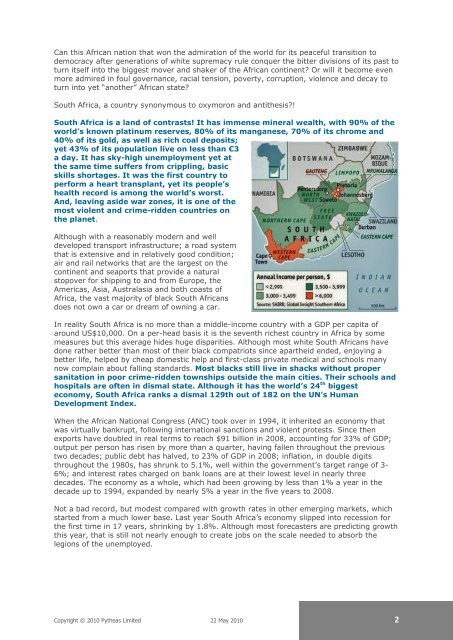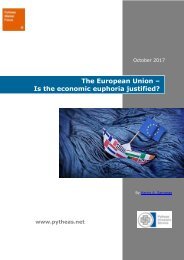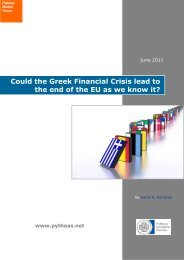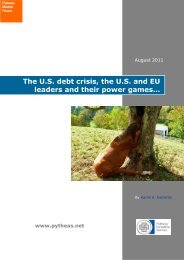South Africa, it is time to turn potential into achievement!
Can this African nation that won the admiration of the world for its peaceful transition to democracy after generations of white supremacy rule conquer the bitter divisions of its past to turn itself into the biggest mover and shaker of the African continent? Or will it become even more admired in foul governance, racial tension, poverty, corruption, violence and decay to turn into yet “another” African state? South Africa is a land of contrasts! It has immense mineral wealth, with 90% of the world’s known platinum reserves, 80% of its manganese, 70% of its chrome and 40% of its gold, as well as rich coal deposits; yet 43% of its population live on less than €3 a day. It has sky-high unemployment yet at the same time suffers from crippling, basic skills shortages. It was the first country to perform a heart transplant, yet its people’s health record is among the world’s worst. And, leaving aside war zones, it is one of the most violent and crime-ridden countries on the planet. Ignoring South Africa (and Africa) today is like failing to invest in emerging markets in the 1990s, in south-east Asia in the 1970s and 1980s or in Japan in the 1950s!
Can this African nation that won the admiration of the world for its peaceful transition to democracy after generations of white supremacy rule conquer the bitter divisions of its past to turn itself into the biggest mover and shaker of the African continent? Or will it become even more admired in foul governance, racial tension, poverty, corruption, violence and decay to turn into yet “another” African state?
South Africa is a land of contrasts! It has immense mineral wealth, with 90% of the world’s known platinum reserves, 80% of its manganese, 70% of its chrome and 40% of its gold, as well as rich coal deposits; yet 43% of its population live on less than €3 a day. It has sky-high unemployment yet at the same time suffers from crippling, basic skills shortages. It was the first country to perform a heart transplant, yet its people’s health record is among the world’s worst. And, leaving aside war zones, it is one of the most violent and crime-ridden countries on the planet.
Ignoring South Africa (and Africa) today is like failing to invest in emerging markets in the 1990s, in south-east Asia in the 1970s and 1980s or in Japan in the 1950s!
You also want an ePaper? Increase the reach of your titles
YUMPU automatically turns print PDFs into web optimized ePapers that Google loves.
Can th<strong>is</strong> <strong>Africa</strong>n nation that won the admiration of the world for <strong>it</strong>s peaceful trans<strong>it</strong>ion <strong>to</strong><br />
democracy after generations of wh<strong>it</strong>e supremacy rule conquer the b<strong>it</strong>ter div<strong>is</strong>ions of <strong>it</strong>s past <strong>to</strong><br />
<strong>turn</strong> <strong>it</strong>self in<strong>to</strong> the biggest mover and shaker of the <strong>Africa</strong>n continent? Or will <strong>it</strong> become even<br />
more admired in foul governance, racial tension, poverty, corruption, violence and decay <strong>to</strong><br />
<strong>turn</strong> in<strong>to</strong> yet “another” <strong>Africa</strong>n state?<br />
<strong>South</strong> <strong>Africa</strong>, a country synonymous <strong>to</strong> oxymoron and ant<strong>it</strong>hes<strong>is</strong>?!<br />
<strong>South</strong> <strong>Africa</strong> <strong>is</strong> a land of contrasts! It has immense mineral wealth, w<strong>it</strong>h 90% of the<br />
world’s known platinum reserves, 80% of <strong>it</strong>s manganese, 70% of <strong>it</strong>s chrome and<br />
40% of <strong>it</strong>s gold, as well as rich coal depos<strong>it</strong>s;<br />
yet 43% of <strong>it</strong>s population live on less than €3<br />
a day. It has sky-high unemployment yet at<br />
the same <strong>time</strong> suffers from crippling, basic<br />
skills shortages. It was the first country <strong>to</strong><br />
perform a heart transplant, yet <strong>it</strong>s people’s<br />
health record <strong>is</strong> among the world’s worst.<br />
And, leaving aside war zones, <strong>it</strong> <strong>is</strong> one of the<br />
most violent and crime-ridden countries on<br />
the planet.<br />
Although w<strong>it</strong>h a reasonably modern and well<br />
developed transport infrastructure; a road system<br />
that <strong>is</strong> extensive and in relatively good cond<strong>it</strong>ion;<br />
air and rail networks that are the largest on the<br />
continent and seaports that provide a natural<br />
s<strong>to</strong>pover for shipping <strong>to</strong> and from Europe, the<br />
Americas, Asia, Australasia and both coasts of<br />
<strong>Africa</strong>, the vast major<strong>it</strong>y of black <strong>South</strong> <strong>Africa</strong>ns<br />
does not own a car or dream of owning a car.<br />
In real<strong>it</strong>y <strong>South</strong> <strong>Africa</strong> <strong>is</strong> no more than a middle-income country w<strong>it</strong>h a GDP per cap<strong>it</strong>a of<br />
around US$10,000. On a per-head bas<strong>is</strong> <strong>it</strong> <strong>is</strong> the seventh richest country in <strong>Africa</strong> by some<br />
measures but th<strong>is</strong> average hides huge d<strong>is</strong>par<strong>it</strong>ies. Although most wh<strong>it</strong>e <strong>South</strong> <strong>Africa</strong>ns have<br />
done rather better than most of their black compatriots since apartheid ended, enjoying a<br />
better life, helped by cheap domestic help and first-class private medical and schools many<br />
now complain about falling standards. Most blacks still live in shacks w<strong>it</strong>hout proper<br />
san<strong>it</strong>ation in poor crime-ridden <strong>to</strong>wnships outside the main c<strong>it</strong>ies. Their schools and<br />
hosp<strong>it</strong>als are often in d<strong>is</strong>mal state. Although <strong>it</strong> has the world’s 24 th biggest<br />
economy, <strong>South</strong> <strong>Africa</strong> ranks a d<strong>is</strong>mal 129th out of 182 on the UN’s Human<br />
Development Index.<br />
When the <strong>Africa</strong>n National Congress (ANC) <strong>to</strong>ok over in 1994, <strong>it</strong> inher<strong>it</strong>ed an economy that<br />
was virtually bankrupt, following international sanctions and violent protests. Since then<br />
exports have doubled in real terms <strong>to</strong> reach $91 billion in 2008, accounting for 33% of GDP;<br />
output per person has r<strong>is</strong>en by more than a quarter, having fallen throughout the previous<br />
two decades; public debt has halved, <strong>to</strong> 23% of GDP in 2008; inflation, in double dig<strong>it</strong>s<br />
throughout the 1980s, has shrunk <strong>to</strong> 5.1%, well w<strong>it</strong>hin the government’s target range of 3-<br />
6%; and interest rates charged on bank loans are at their lowest level in nearly three<br />
decades. The economy as a whole, which had been growing by less than 1% a year in the<br />
decade up <strong>to</strong> 1994, expanded by nearly 5% a year in the five years <strong>to</strong> 2008.<br />
Not a bad record, but modest compared w<strong>it</strong>h growth rates in other emerging markets, which<br />
started from a much lower base. Last year <strong>South</strong> <strong>Africa</strong>’s economy slipped in<strong>to</strong> recession for<br />
the first <strong>time</strong> in 17 years, shrinking by 1.8%. Although most forecasters are predicting growth<br />
th<strong>is</strong> year, that <strong>is</strong> still not nearly enough <strong>to</strong> create jobs on the scale needed <strong>to</strong> absorb the<br />
legions of the unemployed.<br />
Copyright © 2010 Pytheas Lim<strong>it</strong>ed 22 May 2010 2












